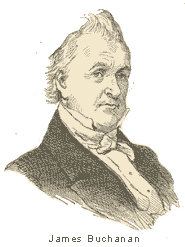Stephen A. Douglas coveted the Democratic nomination in 1856, but his reputation had been badly tarnished by the ongoing violence in Kansas. In his place the Democrats turned to James Buchanan, who had been the minister to Britain from 1853 to 1856 and was not linked to the Kansas issue.  Further, Buchanan was popular in the South because of his part in the Ostend Manifesto.
The Republicans ran their first presidential campaign in 1856, choosing noted Western explorer John C. Frémont, "The Pathfinder." Frémont had no political record (regarded as a plus), but held abolitionist views (a negative in the eyes of many moderates).
The American Party (Know-Nothings) nominated former president Millard Fillmore and capitalized on nativist discontent.
The Republicans ran a campaign calling for repeal of the hated Kansas-Nebraska Act, opposition to the extension of slavery into the territories and support for internal improvement projects. They also took every opportunity to blame the Democrats for the horrors of "Bleeding Kansas."
Buchanan emerged the victor, but failed to gain a majority of the popular vote. In fact, a shift of a small number of votes in several states would have tipped the electoral tally to the Republicans. Mirroring the sectional feelings of the day, the Democrats were strong in the South, the Republicans in the North. The election in 1856 brought a weak president to leadership in a badly divided nation.
Further, Buchanan was popular in the South because of his part in the Ostend Manifesto.
The Republicans ran their first presidential campaign in 1856, choosing noted Western explorer John C. Frémont, "The Pathfinder." Frémont had no political record (regarded as a plus), but held abolitionist views (a negative in the eyes of many moderates).
The American Party (Know-Nothings) nominated former president Millard Fillmore and capitalized on nativist discontent.
The Republicans ran a campaign calling for repeal of the hated Kansas-Nebraska Act, opposition to the extension of slavery into the territories and support for internal improvement projects. They also took every opportunity to blame the Democrats for the horrors of "Bleeding Kansas."
Buchanan emerged the victor, but failed to gain a majority of the popular vote. In fact, a shift of a small number of votes in several states would have tipped the electoral tally to the Republicans. Mirroring the sectional feelings of the day, the Democrats were strong in the South, the Republicans in the North. The election in 1856 brought a weak president to leadership in a badly divided nation.
|
Election of 1856 |
Party |
Electoral Vote |
Popular |
|
James Buchanan (PA) |
Democratic |
174 |
1,832,955 |
|
John C. Frémont (CA) |
Republican |
114 |
1,339,932 |
|
Millard Fillmore (NY) |
American |
8 |
871,731 |